Related Research Articles

Plínio Salgado was a Brazilian politician, writer, journalist, and theologian. He founded and led Brazilian Integralist Action, a political party inspired by the fascist regime of Benito Mussolini.

São Paulo is one of the 26 states of the Federative Republic of Brazil and is named after Saint Paul of Tarsus. A major industrial complex, the state has 21.9% of the Brazilian population and is responsible for 33.9% of Brazil's GDP. São Paulo also has the second-highest Human Development Index (HDI) and GDP per capita, the fourth-lowest infant mortality rate, the third-highest life expectancy, and the third-lowest rate of illiteracy among the federative units of Brazil. São Paulo alone is wealthier than Argentina, Uruguay, Paraguay, and Bolivia combined. São Paulo is also the world's twenty-eighth-most populous sub-national entity and the most populous sub-national entity in the Americas.
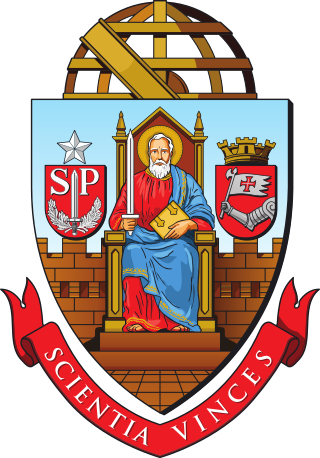
The University of São Paulo is a public university in the Brazilian state of São Paulo. It is the largest Brazilian public university and the country's most prestigious educational institution. USP is involved in teaching, research and university extension in all areas of knowledge, offering a broad range of courses.
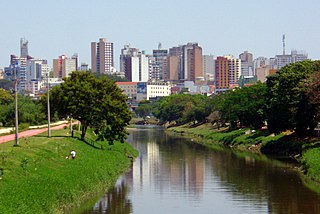
Sorocaba is a municipality in the state of São Paulo, Brazil. Sorocaba is the seventh-largest city in the state of São Paulo. Outside the Greater São Paulo region, it ranks behind only Campinas. It is part of the Metropolitan Region of Sorocaba. The population is 723.574 in an area of 450.38 km2.

The Federal University of São Carlos is a public research university located in São Carlos, state of São Paulo, Brazil.
Captain Baltasar Fernandes was a Portuguese colonist of Brazil who led the expeditions called Bandeirantes into the interior seeking gold, silver, and iron. He was the founder and one of the first settlers of Sorocaba in 1654.

São Paulo State University is a public university run by the state government of São Paulo, Brazil.
Rubem Azevedo Alves was a Brazilian theologian, philosopher, educator, writer and psychoanalyst. Alves was one of the founders of Latin American liberation theology.

The Pontifical Catholic University of São Paulo, locally known as PUC or the Catholic University, is a private and non-profit Catholic university. It is one of the largest and most prestigious universities of Brazil. It is maintained by the Catholic Archdiocese of São Paulo. The university is also responsible for the St. Lucinda Hospital (Sorocaba) and the TUCA theatre
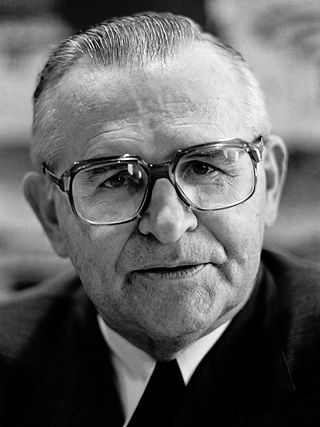
Paulo Evaristo Arns OFM was a Brazilian prelate of the Catholic Church, who was made a cardinal and the Archbishop of São Paulo by Pope Paul VI, and later became cardinal protopriest. His ministry began with a twenty-year academic career, but when charged with responsibility for the Sao Paulo Archdiocese he proved a relentless opponent of Brazil's military dictatorship and its use of torture as well as an advocate for the poor and a vocal defender of liberation theology. In his later years he openly criticized the way Pope John Paul II governed the Catholic Church through the Roman Curia and questioned his teaching on priestly celibacy and other issues.
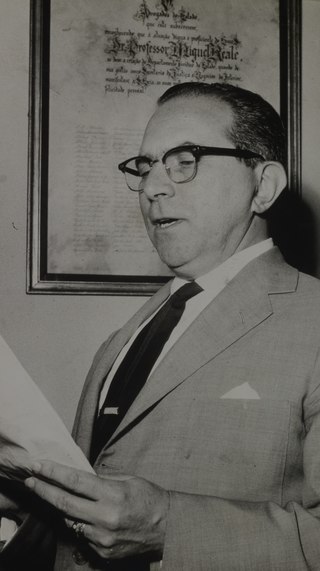
Miguel Reale was a Brazilian jurist, philosopher, academic, politician and poet known as one of the most important jurists of Brazil. He was one of the leaders of Integralism in Brazil and an ideologue of the Brazilian Integralist Action.

Jorge Tibiriçá Piratininga was a Brazilian politician who served as president (governor) of São Paulo.

The Federal Institute of São Paulo, or in full: Federal Institute of Education, Science and Technology of São Paulo is an institution that offers high education and professional education by having a pluricurricular form. It is a multicampi institution, specializing in offering professional and technological education in different areas of knowledge. It was known previously as Federal Center of Technological Education of São Paulo. IFSP is one of the five Federal Colleges in São Paulo, the other ones being ITA, UFSCar, UNIFESP and UFABC.

Fernando Haddad is a Brazilian scholar, lawyer and politician who has served as the Brazilian Minister of Finance since 1 January 2023. He was previously the mayor of São Paulo from 2013 to 2017 and the Brazilian minister of education from 2005 to 2012.
Luiz Castanho de Almeida was a priest, historian and writer. Son of Colonel Anibal Castanho de Almeida and Ana Candida Rolim. He published several books under the pseudonym of Aluisio de Almeida. In 1918, he entered the seminary and attended Philosophy and Theology. Was ordered a priest on May 8, 1927, the Sorocaba Metropolitan Cathedral. After serving as a priest in Itararé, Itapetininga and Guareí in 1933 moved to Sorocaba, where he moved and took over the parish of "Bom Jesus dos Aflitos", in the neighborhood Alem-ponte, Sorocaba. Between 1940 and 1944, he was rector of the diocesan Minor Seminary of São Carlos Borromeu of Sorocaba. He became nationally known for articles that discuss folklore, customs, history, biography, and religion. He worked devotedly for the preservation of memory of Sorocaba. He left some 22 books published and unpublished, which are on file of the Historical, Geographical and Genealogical Institute of Sorocaba - Ihggs, located in the "House of Aluisio de Almeida." The library of the University of Sorocaba takes its name.

The Federal Institute of Minas Gerais, or in full: Federal Institute of Education, Science and Technology of Minas Gerais is a polytechnic university or community college located in the Brazilian cities of Belo Horizonte, Bambuí, Congonhas, Formiga, Governador Valadares, Ouro Preto, Ouro Branco, São João Evangelista and João Monlevade.

Matias Aires Ramos da Silva of Eca was a brasilo-Portuguese philosopher and writer. He immigrated to Portugal in late 1716. Born in colony Brazil, he wrote works in French and Latin and was also a translator of Latin classics. It is considered by many to be the biggest name in 18th century Portuguese Language Philosophy.
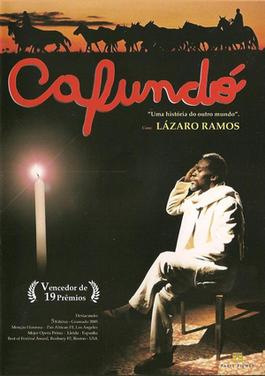
Cafundó is 2005 Brazilian historical drama film written and directed by Paulo Betti and Clóvis Bueno and starring Lázaro Ramos. The film is a biopic based on miracle worker preto velho João de Camargo of Sorocaba and is based on the book João de Camargo de Sorocaba: O Nascimento de uma Religião by Carlos de Campos and Adolfo Frioli. The title comes from a former quilombo, the source of João de Camargo's original spiritual inspiration, located in today's Salto de Pirapora.

Gabriel Benedito Issaac Chalita is a Brazilian lawyer, jurist, professor, writer and politician, member of the Democratic Labor Party (PDT).
David Dias Pimentel was a Portuguese bishop living in Brazil since his youth. His last pastoral work was that of Bishop Emeritus of São João da Boa Vista, São Paulo.